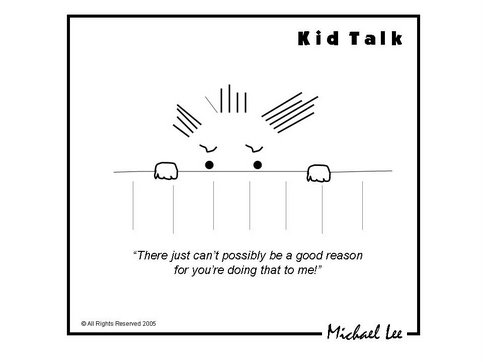

Tuesday, 24 April 2007
2006 10: Unicef rep on violence against children
The Star online. News. Nation. Friday October 20, 2006
BY SHAILA KOSHY
KUALA LUMPUR: As long as a small segment of society allows violence against children to be committed, the rest of society will be “polluted” by their actions.
“Whole societies must come together to say no to violence against children,” said Gaye Phillips, the Unicef Representative to Malaysia and Special Representative to Singapore and Brunei.
She said this yesterday at a forum on “Cherish Our Children – Stop Violence Now!” organised to commemorate the global launch of the United Nations Secretary-General's report on Violence Against Children.
“Much more work needs to be done; Malaysia has so many things going for it and it is important for it to take the lead in stopping this violence,” she added.
According to the report, persistent social acceptance of some types of violence against children – by children themselves, the perpetrators and the public at large – was a major factor in its perpetuation in almost every country.
It said laws in many countries condoned “reasonable” or “lawful” corporal punishment, reflecting societal approval of violence when it was described or disguised as discipline.
It added that the greatest incidence of corporal punishment was at home (98%), alternative care (78%), school (58%), penal system (55% as a sentence and 19% as a disciplinary measure).
“Too many times, intervention is focused on punitive action but how do we change a culture where violence is accepted?” asked Dr Goh Chee Leong, director of psychology at HELP University College.
“There is no point telling a teacher who has to deal with 40 unruly students that he or she cannot cane them. Teachers need to be trained, just as parents, in alternative ways of dealing with such children.”
Prof Datuk Dr Mohd Sham Kasim, Malaysian Association for the Protection of Children president, said that the majority of abused children were in their teens.
He added that the rate of child abuse and neglect in Malaysia of 0.14 per 1,000 children in 2001 and 0.22 in 2004 was just the tip of the iceberg because of the under-reporting of such cases.
International Islamic University law lecturer Dr Farah Nini Dusuki said that “literal misinterpretation of religious texts without examining them in the broader framework of child education had often resulted in corporal punishment being employed as an acceptable mode of discipline.”
Noting that religious communities had the unique possibility of using the inter-generational dimension of their congregations for preventing violence, she suggested that religious leaders study their sacred texts and traditions rigorously to define and identify the limits allowed in disciplining children.
Speaking on the abuse of children with special needs, Datuk Dr Narimah Awin, director of the Ministry of Health's Family Health Division, said Malaysia should have a culture of whistle blowing.
“As a health service provider we come too late into the equation. We need to be advocates as well and as such I have drawn up guidelines for nurses, but that too is not foolproof.”
BY SHAILA KOSHY
KUALA LUMPUR: As long as a small segment of society allows violence against children to be committed, the rest of society will be “polluted” by their actions.
“Whole societies must come together to say no to violence against children,” said Gaye Phillips, the Unicef Representative to Malaysia and Special Representative to Singapore and Brunei.
She said this yesterday at a forum on “Cherish Our Children – Stop Violence Now!” organised to commemorate the global launch of the United Nations Secretary-General's report on Violence Against Children.
“Much more work needs to be done; Malaysia has so many things going for it and it is important for it to take the lead in stopping this violence,” she added.
According to the report, persistent social acceptance of some types of violence against children – by children themselves, the perpetrators and the public at large – was a major factor in its perpetuation in almost every country.
It said laws in many countries condoned “reasonable” or “lawful” corporal punishment, reflecting societal approval of violence when it was described or disguised as discipline.
It added that the greatest incidence of corporal punishment was at home (98%), alternative care (78%), school (58%), penal system (55% as a sentence and 19% as a disciplinary measure).
“Too many times, intervention is focused on punitive action but how do we change a culture where violence is accepted?” asked Dr Goh Chee Leong, director of psychology at HELP University College.
“There is no point telling a teacher who has to deal with 40 unruly students that he or she cannot cane them. Teachers need to be trained, just as parents, in alternative ways of dealing with such children.”
Prof Datuk Dr Mohd Sham Kasim, Malaysian Association for the Protection of Children president, said that the majority of abused children were in their teens.
He added that the rate of child abuse and neglect in Malaysia of 0.14 per 1,000 children in 2001 and 0.22 in 2004 was just the tip of the iceberg because of the under-reporting of such cases.
International Islamic University law lecturer Dr Farah Nini Dusuki said that “literal misinterpretation of religious texts without examining them in the broader framework of child education had often resulted in corporal punishment being employed as an acceptable mode of discipline.”
Noting that religious communities had the unique possibility of using the inter-generational dimension of their congregations for preventing violence, she suggested that religious leaders study their sacred texts and traditions rigorously to define and identify the limits allowed in disciplining children.
Speaking on the abuse of children with special needs, Datuk Dr Narimah Awin, director of the Ministry of Health's Family Health Division, said Malaysia should have a culture of whistle blowing.
“As a health service provider we come too late into the equation. We need to be advocates as well and as such I have drawn up guidelines for nurses, but that too is not foolproof.”
Subscribe to:
Post Comments (Atom)



No comments:
Post a Comment